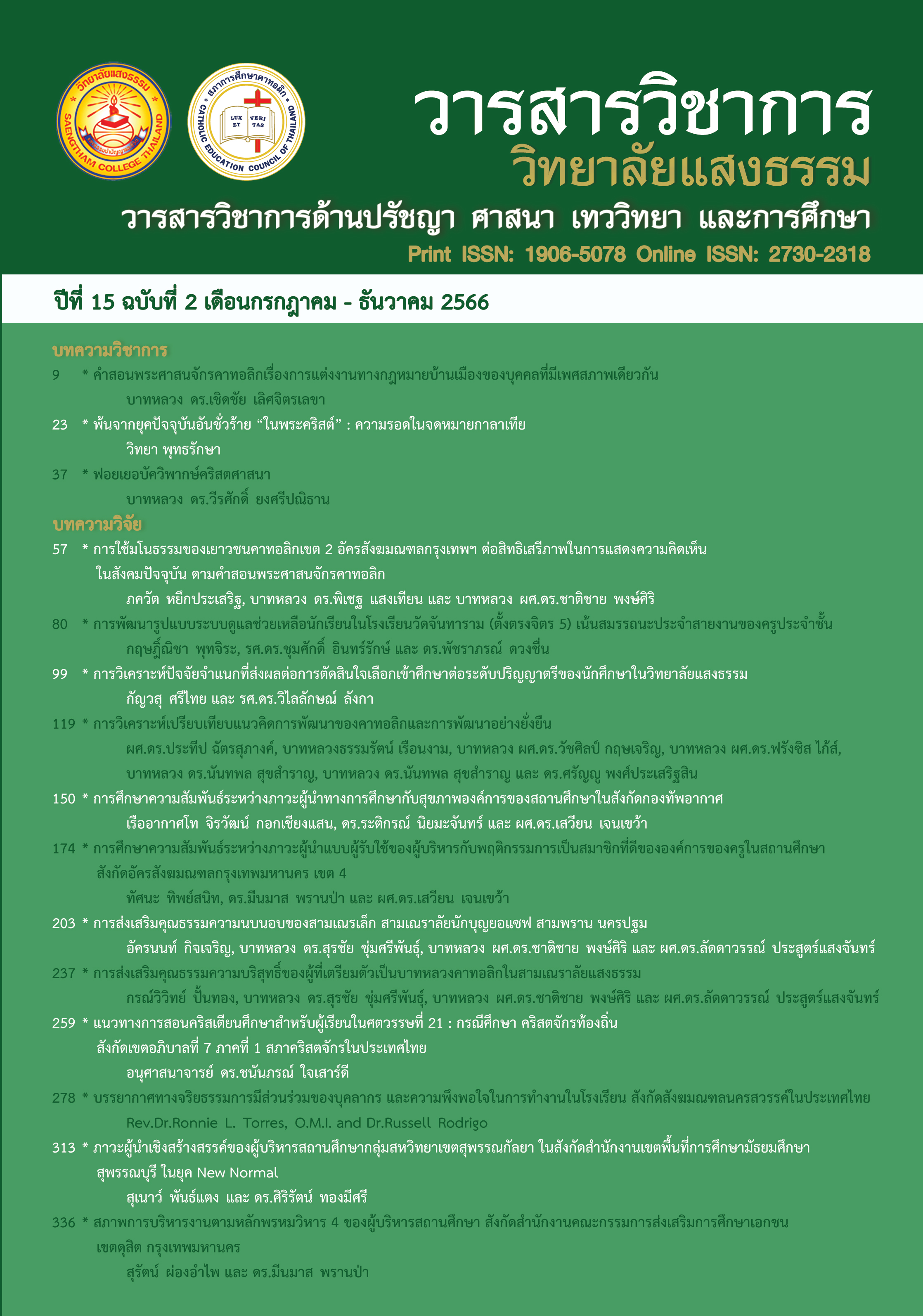Application of Conscience of The Catholic Youth In The Second Deanery of The Archdiocese of Bangkok to The Right of Free Speech In Thai Society According to The Teaching of The Catholic Church.
Main Article Content
Abstract
The aims of this qualitative research were to investigate the application of conscience of the catholic youth in the second deanery of the Archdiocese of Bangkok to the right of freedom of expression in Thai Society according to the teaching of the Catholic Church, and to establish the guidelines for the nourishment of conscience of the catholic youth to the right of freedom of expression in Thai Society. The qualitative data was collected from twelve catholic youths in the second deanery of the Archdiocese of Bangkok selected specifically and focused-group interviews of ten experts selected specifically. The data were analyzed by content analysis.
The results of this research reveal:
For the first aim, the research found that the exercise of conscience of the Catholic youth to the right of freedom of expression in Thai Society, there was some consistency between individuals, but the influencing factors differed. It is influenced by fundamentals such as family, education, social status, understanding of the teaching of the Catholic Church, and also by the participation in parish activities, especially those who play apart in the formation of personal conscience and a close relationship with God. Each factor plays a role and has a cumulative effect on individual attitudes for applying conscience to the right of freedom to express their opinions about various social issues. The research found that most of the Catholic youths selected apply conscience according to the teaching of the Catholic Church by researching and analyzing information in order to express their opinions carefully and deliberately, followed by contemplation of moral law, natural law, Christian law and the teaching of the Catholic Church, and then applying their conscience to analyze the effects. Preference is given to the common good over personal good. Contemplative prayer is used to listen to the voice of God before deciding to exercise freedom of expression, and they listen to others freely using reason rather than emotion.
For the second aim, to find the guidelines to nurture the conscience of the Catholic youth to the right of freedom of expression in Thai Society, the family, pastors and the associations of the Catholic Church in Thailand should cooperate to guide, train and nurture the right conscience in the youth, a correct understanding of conscience and the right of freedom according to the teaching of Jesus Christ and the catholic Church, and help them to put it into action infallibly and properly. They should also guide them in showing suitable respect to each other through conscience and the right to freedom in the spirit of the Gospel by implementing the following guidelines: (1) Families should teach and listen to young people and work to understand and relate to them. (2) The Church and families should work together to encourage young people to participate in church activities, such as Holy mass, the catechism and many different activities of the parish and the local church. (3) Within social groups, young people should exchange ideas, opinions, and attitudes with each other in order to practice expressing themselves freely. (4) Related institutions should instill in the youth the correct way to exercise their rights under supervision by the Church and allow young people to know how to exchange attitudes with each other effectively. With the right conscience, they can be free of prejudice and be equipped with ideals suitable for the future, so they can move forward with the Catholic Church. (5) The Catholic Church should offer the space where opinions and attitudes can be expressed freely and where they will be listened to under Church supervision in order to nurture good conscience in the youth to the right of freedom of expression in Thai society, so they can advance together through other levels of society
Article Details

This work is licensed under a Creative Commons Attribution-NonCommercial-NoDerivatives 4.0 International License.
- The academic and research articles, as well as the content and opinions expressed therein, published in Saengtham College Journal are solely the responsibility of the respective author(s).
- Articles published in Saengtham College Journal are the property of Saengtham College. Reproduction, modification, or dissemination of all or part of the content in any form without written permission from Saengtham College is prohibited.
- Articles published in Saengtham College Journal are protected under the Copyright Act.
References
คณะกรรมการคาทอลิกเพื่อคริสตธรรม แผนกพระคัมภีร์. (2557) พระคัมภีร์คาทอลิกฉบับสมบูรณ์. โรงพิมพ์อัสสัมชัญ.
คณะกรรมการคาทอลิกเพื่อคริสตศาสนธรรม แผนกคริสตศาสนธรรม สภาประมุขบาทหลวงโรมันคาทอลิก แห่งประเทศไทย. (2562). หนังสือคำสอนพระศาสนจักร. โรงพิมพ์อัสสัมชัญ.
เจริญ อาทิตยา, บาทหลวง. (2537). คำสอนเรื่องมโนธรรม. ม.ป.พ.
เชิดชัย เลิศจิตรเลขา, บาทหลวง. (2548). คริสตจริยศาสตร์พื้นฐาน. แผนกการพิมพ์โรงเรียนดอนบอสโก.
ทิพย์ทอง ภ. (2562). Christus Vivit [พระคริสต์ทรงพระชนม์]. โรงพิมพ์อัสสัมชัญ.
ไทย พับลิก้า. (2560, 17 พฤศจิกายน). จาก ข้อเสนอ “การพัฒนาคนรุ่นใหม่” บนความเข้าใจ “วัฒนธรรมเยาวชน”. https://thaipublica.org/2017/11/newground01/
ธเนศน์ นุ่มมัน. (2554, 22 เมษายน). พลังคนรุ่นใหม่: พลังการเปลี่ยนแปลง. โพสต์ทูเดย์. https://posttoday.com/politic/report/84943.
บุญเจือ ก. (2557). Fides et Ratio [ศรัทธากับเหตุผล]. ปิติพานิช
ปฬาณี ฐิติวัฒนา. (2535) การพัฒนาเด็ก เยาวชน และสตรี. ม.ป.พ.
ปฏิคม วิริยะสมบัติ. (2557). การหล่อหลอมมโนธรรมตามแบบอย่างนักบุญอิกญาซีโอแห่งโลโยลา. [วิทยานิพนธ์ปริญญามหาบัณฑิต]. วิทยาลัยแสงธรรม.
ปิ่นบุญญา ลำมะนา. (2566). การจำกัดเสรีภาพในการแสดงความคิดเห็นและการแสดงออกในประเทศไทย. วารสารสังคมศาสตร์ นิติรัฐศาสตร์, 1(2), 63-81. https://so02.tci-thaijo.org/index.php/Lawpol_Journal/article/view/244497/165748
แผนกคริสตศาสนธรรม อัครสังฆมณฑลกรุงเทพฯ. (2557, 28 กรกฎาคม). ทำอย่างไรจะปฏิบัติตนเป็นเยาวชนคาทอลิกที่ดี. http://www.kamsonbkk.com/encouragement/love/5274
พรชัย สิงห์สา. (2556). วิธีการหล่อหลอมมโนธรรมของพระสงฆ์คาทอลิกต่อคริสตชนในสังมณฑลนครสวรรค์ หลังสังคายนาวาติกันที่ 2. [วิทยานิพนธ์ปริญญามหาบัณฑิต]. วิทยาลัยแสงธรรม.
ราชบัณฑิตยสถาน. (2566). พจนานุกรมฉบับราชบัณฑิตยสถาน พ.ศ. 2542. นานมีบุคส์ พับลิเคชันส์.
ราชบัณฑิตยสถาน. (2566, 6 มกราคม). พจนานุกรมฉบับราชบัณฑิตยสถาน พ.ศ. 2554. https://dictionary.orst.go.th/
ลาวัลย์ นาคดิลก. (2561). แนวทางการพัฒนาพฤตินิสัยของเยาวชน. วารสารวิชาการ มหาวิทยาลัยราชภัฏ ศรีสะเกษ, 12(1), 1.
วีรยุทธ เกียรติสกุลชัย. (2556). มโนธรรมของคริสตชนในการรับศีลอภัยบาปกรณีศึกษา คริสตชนวัดพระมารดานิจจานุเคราะห์ คลองจั่น. [วิทยานิพนธ์ปริญญามหาบัณฑิต]. วิทยาลัยแสงธรรม.
วัชศิลป์ กฤษเจริญ. (2566, 3 กุมภาพันธ์). มโนธรรม สำหรับคาทอลิกคืออะไรและสำคัญอย่างไร. ศูนย์คริสตศาสนธรรมสังฆมณฑลราชบุรี. https://www.kamsondeedee.com/main/2008-11-13-03-15-50/47-35/920-2009-06-27-14-49-53
ศิริวิริยานันท์ น. (2537). Veritatis Splender [พระสมณสาสน์เรื่องความรุ่งโรจน์แห่งความจริง]. โรงพิมพ์อัสสัมชัญ.
สำนักงานสถิติแห่งชาติ. (ม.ป.ป.). สำรวจข้อมูลเกี่ยวกับเด็กและเยาวชน ปี 2540. https://statstd.nso.go.th/definition/projectdetail.aspx?periodld=46&defprodefld=548
อิสระนิวส์. (2564, 13 ธันวาคม). 10 เรื่องเด่น ‘สิทธิเสรีภาพ’ ปี 64 นำการขับเคลื่อนโดยเด็กเยาวชน ภาคประชาสังคม. https://www.isranews.org/article/isranews-scoop/104928-isranews-226.html
Human Rights Lawyers Association. (2021, 21 มิถุนายน). สิทธิของเยาวชน บทกฎหมายที่รัฐละเลย. https://naksit.net/2021/06/child-rights-protection/
Thiraphon Singlor. (2021, 18 พฤศจิกายน). คนรุ่นใหม่เชื่อว่าอนาคตจะดีขึ้น แต่ต้องการเปลี่ยนแปลง – ลงมือทำอย่างเร่งด่วน – ตนเองเป็นส่วนหนึ่งของ ‘โซลูชัน’. https://www.sdgmove.com/2021/11/18/young-generations-are-hopeful-of-the-future-but-needs-more-actions
Funk, A. (2022, November 18). Freedom of Expression. Freedom House. https://freedomhouse.org
Robert E. Alberti, Michael L. Emmons. (2008). Your Perfect Right: Assertiveness and Equality in Your Life and Relationships. Self-Help.
Sasse, C.R. (1987). Person to Person. Benefit.


